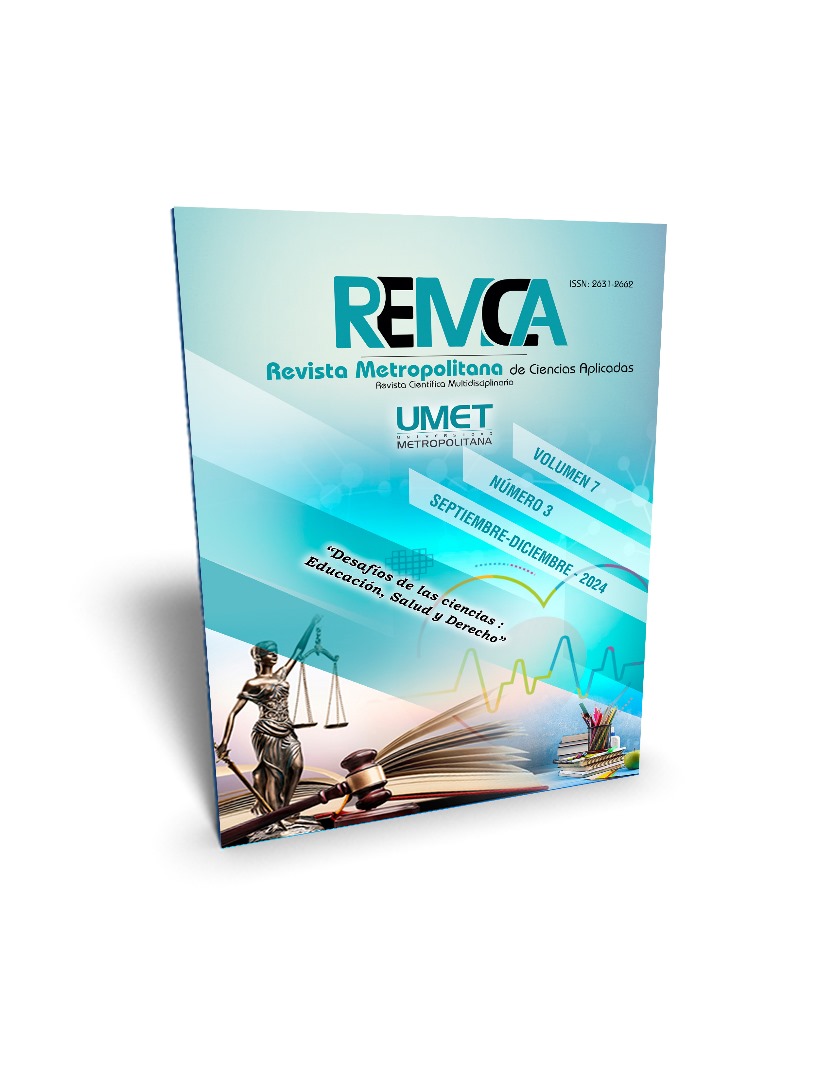Mediation in the area of family, childhood and adolescence, as an effective method to optimize the procedural system in the city of Milagro
DOI:
https://doi.org/10.62452/8853m388Keywords:
Family mediation, conflict resolution, procedural decongestion, culture of peace, best interests of the childAbstract
Mediation as an alternative method of conflict resolution is recognised in Ecuadorian legislation, that is, in our Constitution of the Republic of Ecuador, in the Law of Arbitration and Mediation, as well as in the Organic Code of Childhood and Adolescence, and other regulations that refer to it. The objective of this study was to determine the effectiveness in the area of family, children and adolescents, as a mechanism to decongest the procedural system in the city of Milagro. The research focused on a mixed, descriptive, explanatory and propositional system that allowed us to understand the procedural phenomenon and to make a proposal with the aim of optimising the principle of procedural speed and economy. In the same way, empirical level methods, methods of analysis and documentary review, theoretical level methods and techniques and instruments such as interviews and surveys were used. For this reason, the proposal was made, which implies the obligatory nature of an act of impossibility of mediation that accompanies the lawsuit, prior to the initiation of a judicial process, which promotes the achievement of amicable, fast and satisfactory agreements, as well as the decongestion of the Ecuadorian justice system, based on factors such as speed, confidentiality and a lower amount of expenses for the processing of the process, and safeguards the welfare and interest of minors. A culture of peace prevails between parties, where an agreement is reached that is centred on their needs, contributing to a fair, equitable and collaborative society.
Downloads
References
Cabrera Cabrera, S. V., Cevallos Ortega, F. J., Mena Manzanillas, P. L., Maldonado Ordoñez, J. A., Ramírez Granda, K. F., Mena Manzanillas, W. B., & Loayza Apolo, F. R. (2023). La mediación prejudicial obligatoria en materia de familia, niñez y adolescencia en la legislación de Ecuador como garantía del interés superior del niño. LATAM Revista Latinoamericana de Ciencias Sociales y Humanidades. https://doi.org/https://doi.org/10.56712/latam.v4i4.1205
Castillo Gaona, R. B. (2018). La Mediación. Corporación de Estudios y Publicaciones.
Costela Aznar, J. (2003). La mediación familiar: Una aproximación. En, J. Costela Aznar, Proyección, teología y mundo actual. (pp. 117-131). Editorial: Universidad Loyola.
Echanique, H. (2010). La Mediación, una alternativa a la solución de conflictos. Editorial Jurídico del Ecuador.
Ecuador. Asamblea Nacional Constituyente. (2008). Constitución de la República del Ecuador. Registro Oficial 449. https://www.oas.org/juridico/pdfs/mesicic4_ecu_const.PDF
Ecuador. Congreso Nacional. (2003). Código de la Niñez y Adolescencia. Registro oficial 737. https://www.igualdad.gob.ec/wp-content/uploads/downloads/2019/12/codigo_ninez_adolescencia_nov2019.pdf
Ecuador. Congreso Nacional. (2006). Ley de Arbitraje y Mediación. Registro Oficial 417. https://www.gob.ec/sites/default/files/regulations/2019-09/LEY%20DE%20ARBITRAJE%20Y%20MEDIACION_21_08_2018.pdf
Folberg, J., & Taylor, A. (1997). Mediation: A Comprehensive Guide to Resolve Conflicts Without Litigation. Editorial Limusa.
García-Longoria Serrano, M., & Sánchez Urios, A. (2004). La Mediación Familiar como forma de respuesta a los conflictos familiares. Portularia: Revista de Trabajo Social, 4, 261-268. https://dialnet.unirioja.es/servlet/articulo?codigo=860445&orden=89588&info=link
Hernández, M. (2003). La mediación en la resolución de conflictos. En, M. D. Hernández, La Mediación. (pp. 125-136). Universitat de Barcelona.
Hernández, N. B., Vázquez M, Y. L., & Carrera A., R. A. (2023). Medidas Cautelares para proteger el derecho laboral de personas con enfermedades catastróficas, terminales y raras en Ecuador. Dilemas contemporáneos: Educación, Política y Valores. https://dilemascontemporaneoseducacionpoliticayvalores.com/index.php/dilemas/article/view/3959
López Clavo, M. (2012). La mediación familiar como método alternativo de solución de conflictos familiares. Revista Caribeña de Ciencias Sociales. https://ideas.repec.org/a/erv/rccsrc/y2012i2012_1021.html
Manobanda Armijo, K. A., & Barragán García, J. G. (2023). La Mediación en el régimen de visitas como método efectivo para descongestionar el Sistema Judicial en Ecuador. LATAM: Revista Latinoamericana de Ciencias Sociales y Humanidades, 4(2). https://doi.org/https://doi.org/10.56712/latam.v4i2.676
Palandri, E., & Luchino, G. (2023). Mediación Familiar. Alveroni Ediciones.
Parra Ramos, A. C. (2017). La Mediación como Fase Pre-Procesal en el Ámbito de Niñez y Adolescencia para la Descongestión Judicial en la Legislación Ecuatoriana. (Trabajo de titulación). Pontifica Universidad Católica del Ecuador sede Ambato.
Vargas, J. E. (2008). Mediación Obligatoria. Algunas razones para justificar su incorporación. Revista de derecho (Valdivia), 4(2), 183-202. https://www.scielo.cl/scielo.php?script=sci_arttext&pid=S0718-09502008000200008
Downloads
Published
Issue
Section
License
Copyright (c) 2024 Juan José Alvarado-Coello, Andrea Michelle Guin-Sebichay, Noel Batista-Hernández (Autor/a)

This work is licensed under a Creative Commons Attribution-NonCommercial-ShareAlike 4.0 International License.
Authors who publish in Revista Metropolitana de Ciencias Aplicadas (REMCA), agree to the following terms:
1. Copyright
Authors retain unrestricted copyright to their work. Authors grant the journal the right of first publication. To this end, they assign the journal non-exclusive exploitation rights (reproduction, distribution, public communication, and transformation). Authors may enter into additional agreements for the non-exclusive distribution of the version of the work published in the journal, provided that acknowledgment of its initial publication in this journal is given.
© The authors.
2. License
The articles are published in the journal under the Creative Commons Attribution-NonCommercial-ShareAlike 4.0 International License (CC BY-NC-SA 4.0). The terms can be found at: https://creativecommons.org/licenses/by-nc-sa/4.0/deed.en
This license allows:
- Sharing: Copying and redistributing the material in any medium or format.
- Adapting: Remixing, transforming, and building upon the material.
Under the following terms:
- Attribution: You must give appropriate credit, provide a link to the license, and indicate if any changes were made. You may do this in any reasonable manner, but not in any way that suggests the licensor endorses or sponsors your use.
- NonCommercial: You may not use the material for commercial purposes.
- ShareAlike: If you remix, transform, or build upon the material, you must distribute your creation under the same license as the original work.
There are no additional restrictions. You may not apply legal terms or technological measures that legally restrict others from doing anything the license permits.




